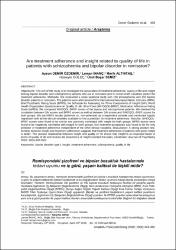| dc.contributor.author | Demir Özdemir, Aysun | |
| dc.contributor.author | Inanç, Leman | |
| dc.contributor.author | Altıntaş, Merih | |
| dc.contributor.author | Güleç, Hüseyin | |
| dc.contributor.author | Semiz, Ümit Başar | |
| dc.date.accessioned | 2020-11-20T14:50:51Z | |
| dc.date.available | 2020-11-20T14:50:51Z | |
| dc.date.issued | 2018 | |
| dc.identifier.issn | 1302-6631 | |
| dc.identifier.uri | https://doi.org/10.5455/apd.290161 | |
| dc.identifier.uri | https://hdl.handle.net/20.500.12809/1636 | |
| dc.description | WOS: 000447766200002 | en_US |
| dc.description.abstract | Objectives: The aim of this study is to investigate the association of treatment adherence, quality of life and insight among bipolar disorder and schizophrenia patients who are in remission and to reveal which variables predict the treatment adherence. Methods: We conducted a cross sectional study with 150 schizophrenia and 150 bipolar disorder patients in remission. The patients were administered Mini International Neuropsychiatric Interview (MINI), Brief Psychiatric Rating Scale (BPRS), the Schedule for Assessing the Three Components of Insight (SAI), World Health Organization Questionnaire on Quality of Life: Short Form (WHOQOL-BREF), Medication Adherence Rating Scale (MARS). We compared WHOQOL-BREF scores of the bipolar and schizophrenia patients. We checked the correlation between SAI scores and BPRS scores as well as between SAI scores and WHOQOL-BREF scores for both groups. We set MARS results (adherent vs. non-adherent) as a dependent variable and conducted logistic regression with all the clinical variables available to find a predictor for treatment adherence. Results: WHOQOL-BREF scores were found to be similar and positively correlated with insight for both groups. BPRS scores were found to be negatively correlated with insight for both groups. SAI treatment acceptance was found to be the only predictor of treatment adherence independent of the other clinical variables. Discussion: A strong positive relationship between insight and treatment adherence suggests that treatment adherence of patients with good insight is better. The positive relationship between insight and quality of life shows that insight is an important factor in terms of quality of life and reveals the importance of insight oriented therapies. | en_US |
| dc.item-language.iso | eng | en_US |
| dc.publisher | Cumhuriyet Univ Tip Fak Psikiyatri Anabilim Dali | en_US |
| dc.item-rights | info:eu-repo/semantics/openAccess | en_US |
| dc.subject | Bipolar Disorder Type I | en_US |
| dc.subject | Insight | en_US |
| dc.subject | Treatment Adherence | en_US |
| dc.subject | Schizophrenia | en_US |
| dc.subject | Quality of Life | en_US |
| dc.title | Are treatment adherence and insight related to quality of life in patients with schizophrenia and bipolar disorder in remission? | en_US |
| dc.item-type | article | en_US |
| dc.contributor.department | MÜ, Tıp Fakültesi, Dahili Tıp Bilimleri Bölümü | en_US |
| dc.contributor.institutionauthor | Inanç, Leman | |
| dc.contributor.institutionauthor | Semiz, Ümit Başar | |
| dc.identifier.doi | 10.5455/apd.290161 | |
| dc.identifier.volume | 19 | en_US |
| dc.identifier.issue | 5 | en_US |
| dc.identifier.startpage | 443 | en_US |
| dc.identifier.endpage | 450 | en_US |
| dc.relation.journal | Anadolu Psikiyatri Dergisi-Anatolian Journal of Psychiatry | en_US |
| dc.relation.publicationcategory | Makale - Uluslararası Hakemli Dergi - Kurum Öğretim Elemanı | en_US |


















